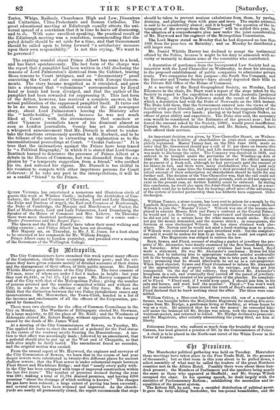The expiring scandal about Prince Albert has come to a
head, and has burst spontaneously. The last form of the charge was the report that a pamphlet had been written in 1851 disclosing the reasons of Lord Palmerston's dismissal from the Cabinet, tracing those reasons to Court intrigues, and on " documentary " proof convicting the Court of close connexion with Foreign Govern- ments. The story became magnified as it circulated, and grew into a statement that "voluminous" correspondence by Royal hand or hands had been divulged, and that the author of the pamphlet had been rewarded for suppressing it. This last form of the fiction, however, has received a complete answer, in the actual publication of the suppressed pamphlet itself. It turns out to be no more than an inflated version of the old newspaper story, about Lord Palmerston's leaving the Ministry after the " bottle-holding " incident, because he was not ranch liked at Court ; with the circumstance that somehow or other Viennese journalists knew of his dismissal almost as soon as London journalists. Gossip has set in circulation a whispered announcement that Mr. Disraeli is about to under- take the functions erroneously ascribed to Mr. Roebuck, and to be the tribune of the nation in extracting an explanation as to the tuiconstitutional proceedings at Court. " Credat Tudieus! " It is true that the insinuations against the Prince have been traced to "a Political Biography," in which it is stated that Lord George Boutin& burned to denounce the presence of Prince Albert at a debate in the House of Commons, but was dissuaded from the ex- plosion by "a temperate suggestion from a friend," who soothed his ire, and softened his rigour. Mr. Disraeli is too skilful in his vocation to compete with other impetuous persons for Court disfavour : if he take any part in the interpellations, it will be as a candid " friend " to the Prince.






























 Previous page
Previous page